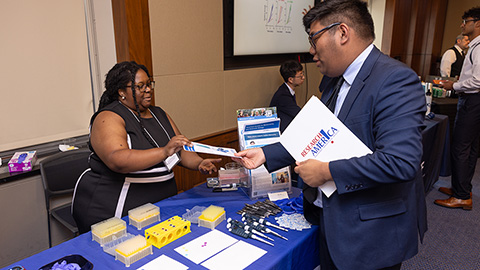ASBMB raises concerns about proposed NIH subaward policy
On July 5, the American Society for Biochemistry and Molecular Biology raised concerns regarding proposed changes to the National Institutes of Health “Grants Policy Statement.”
The NIH seeks to require foreign researchers working on NIH-funded projects to provide to the primary grantee copies of all lab notebooks, data and documentation that support the research progress report every six months. Instead, the society proposed that this material be made available upon request by the principal investigator.
NIH subawards, also known as consortium agreements, promote collaboration between a primary grantee and subrecipient(s) across institutions.
According to the National Science Foundation, laboratory principal investigators spend 42% of their time on administrative tasks, leaving less-than-adequate time for their research programs.
The ASBMB argued that the NIH proposal would require PIs to review an unnecessarily large amount of material and “place undue stress and time constraints on PIs who are already struggling.”
The other potentially harmful outcome is reduced collaboration, the ASBMB said. Between 2008 and 2018, 23% of science and engineering articles included international collaborators.
“Collaboration is absolutely crucial for science to push boundaries and advance society,” Sarina Neote, ASBMB public affairs director, said. “By increasing the administrative burden of PIs, this policy discourages collaboration across borders, which will harm the international research enterprise.”
The ASBMB acknowledged that some foreign collaborators have presented challenges to U.S.-based researchers. However, the society said the proposed policy is “inherently unequal” and urged the NIH to reconsider the rule’s purpose and potential unintended consequences.
Enjoy reading ASBMB Today?
Become a member to receive the print edition four times a year and the digital edition monthly.
Learn moreGet the latest from ASBMB Today
Enter your email address, and we’ll send you a weekly email with recent articles, interviews and more.
Latest in Policy
Policy highlights or most popular articles

Embrace your neurodivergence and flourish in college
This guide offers practical advice on setting yourself up for success — learn how to leverage campus resources, work with professors and embrace your strengths.

ASBMB honors Lawrence Tabak with public service award
He will deliver prerecorded remarks at the 2025 ASBMB Annual Meeting in Chicago.

Summer internships in an unpredictable funding environment
With the National Institutes of Health and other institutions canceling summer programs, many students are left scrambling for alternatives. If your program has been canceled or delayed, consider applying for other opportunities or taking a course.

Black excellence in biotech: Shaping the future of an industry
This Black History Month, we highlight the impact of DEI initiatives, trailblazing scientists and industry leaders working to create a more inclusive and scientific community. Discover how you can be part of the movement.

ASBMB releases statement on sustaining U.S. scientific leadership
The society encourages the executive and legislative branches of the U.S. government to continue their support of the nation’s leadership in science.

ASBMB and advocacy: What we accomplished in 2024
PAAC members met with policymakers to advocate for basic scientific research, connected some fellow members with funding opportunities and trained others to advocate for science.

